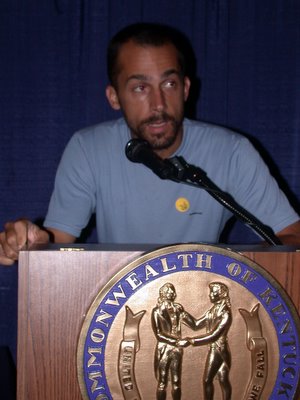 In terms of blindly exaggerated sense of self importance, eternally moustached Mike Levine of Triumph deserves a special place in the Failed Bands of Oklahoma Bass Bank. The Canadian three-piece doesn't well wear over time -- their songs seem firmly stuck in the hard/pop rock shlock of the the mid '80s; Rolling Stone once called them "mutant hoseheads," and the bands two original members Mike and drummer Gil Moore eventually wrestled control from the one member (golden-haired guitarist/vocalist Rik Emmett) who made their only memorable songs ("Lay it On the Line," "Magic Power" etc). Best off, Mike -- the only member who didn't sing lead -- likes to take credit for it all, a la Manzarek of the Doors.
In terms of blindly exaggerated sense of self importance, eternally moustached Mike Levine of Triumph deserves a special place in the Failed Bands of Oklahoma Bass Bank. The Canadian three-piece doesn't well wear over time -- their songs seem firmly stuck in the hard/pop rock shlock of the the mid '80s; Rolling Stone once called them "mutant hoseheads," and the bands two original members Mike and drummer Gil Moore eventually wrestled control from the one member (golden-haired guitarist/vocalist Rik Emmett) who made their only memorable songs ("Lay it On the Line," "Magic Power" etc). Best off, Mike -- the only member who didn't sing lead -- likes to take credit for it all, a la Manzarek of the Doors.Apparently Mike, who often wore a hockey jersey on stage, had been playing for six months with Gil in a "hootchie cootchie" band when he felt enough was enough. "I checked my bass at the door. I said I was leaving unless he wanted to do something special. I said, 'Gil, there is a market for a special kind of band and I think we could do something cool.' We found Rik and away we went." If only more failed bands had thought of that.
Mike also claims that he produced "anything that says Triumph on it" even though it was frequently credited to an actual producer. Mike also claims that he -- the bass player -- picked whether Gil or Rik would sing a song. "Rik would sing the softer or wimpier stuff and Gil would sing the tougher stuff."
One wonders if Levine was behind the decision, in 1984, to (originally) release the album "Thunder Seven" on CD only -- at a time when very few listeners had CD players.
Rik has claimed the reason he left was a "lack of trust" of Gil and Mike, who insisted on joint songwriting credits of his songs, including classical guitar compositions.
 It's worth repeating. Triumph is not a very good band. Gil describes their sound as the "cross of the Who and Emerson, Lake and Palmer" -- this is NOT an area that anyone needs to travel in. When Rik left the band, Levine engineered bringing in a faceless guitarist from Aldo Nova to replace him, and let a new keyboard player sing Rik's songs. Sales suffered, to the point of nonexistence in the USA.
It's worth repeating. Triumph is not a very good band. Gil describes their sound as the "cross of the Who and Emerson, Lake and Palmer" -- this is NOT an area that anyone needs to travel in. When Rik left the band, Levine engineered bringing in a faceless guitarist from Aldo Nova to replace him, and let a new keyboard player sing Rik's songs. Sales suffered, to the point of nonexistence in the USA.Presently Rik is in the studio recording and has invited Gil (not Mike) to help out.
--> Mike Levine, we just want to thank you.
FBO Admin
Mobile/Semi-Permanent HQ -- Brooklyn, NY
**From March 22 to April 5, FBO is celebrating the forgotten, overlooked, abused or under-utilized bass by noting a handful of bass players you should know about.**












